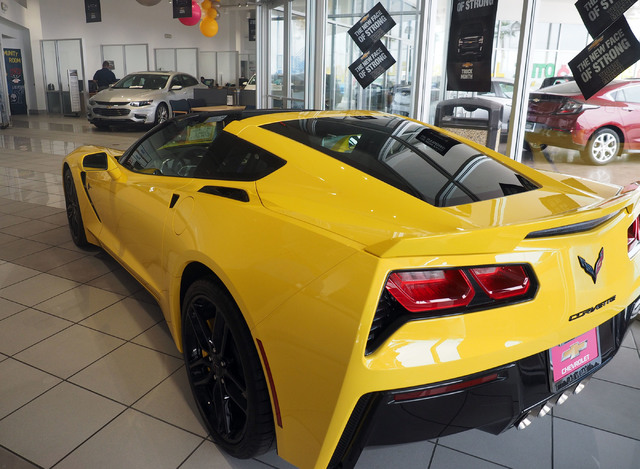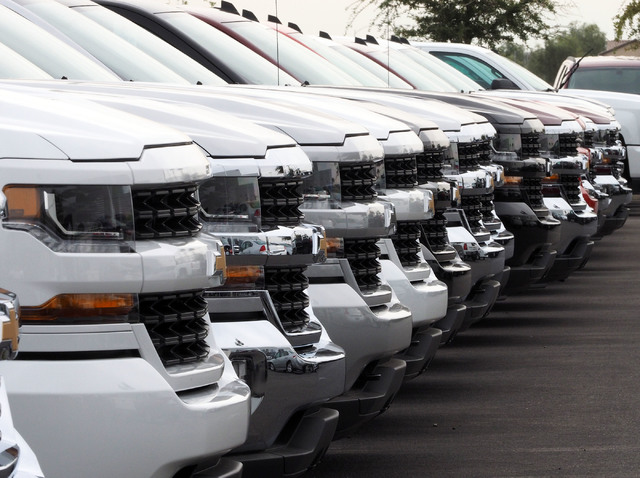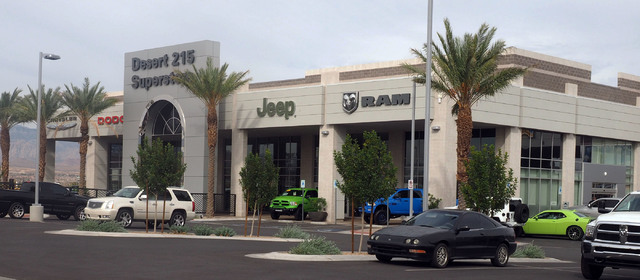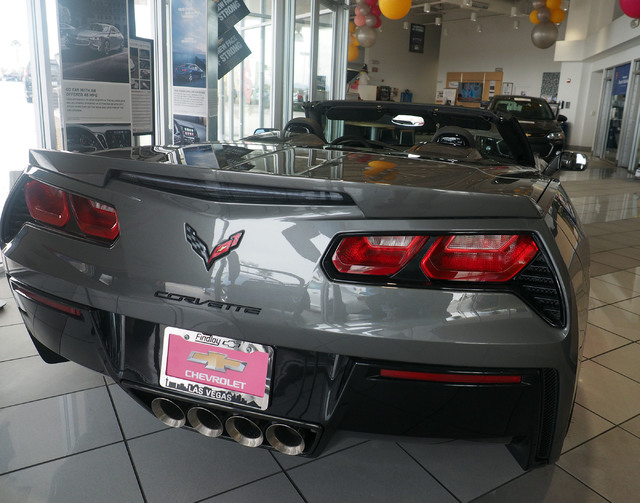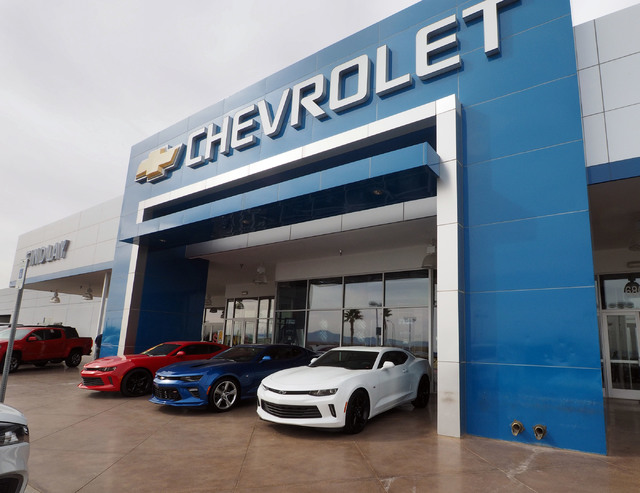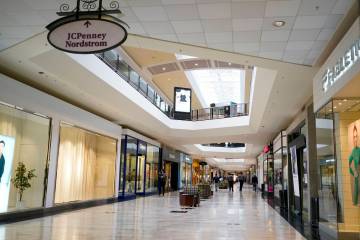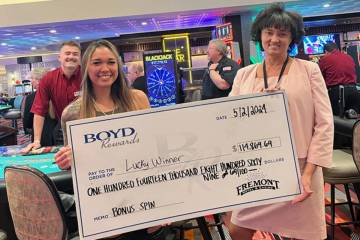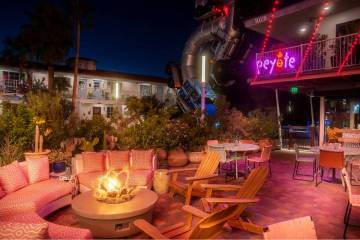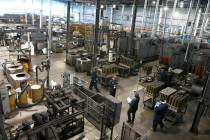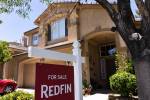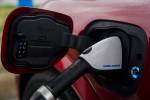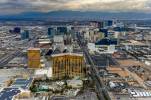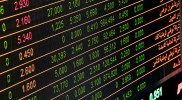Car dealerships flock to southwest Las Vegas Valley
With new housing developments, retail plazas and warehouses taking shape, southwest Las Vegas is one of the fastest-growing areas of the valley.
It’s also home to a new cluster of another sort of project: car dealerships.
A handful of auto dealers have opened in the southwest over the past few years, and at least a few more are in the works. Car lots are bunched together just south of the 215 Beltway between Rainbow and Jones boulevards, with some others sprinkled around the area.
The Desert 215 Superstore, which sells Chrysler, Dodge, Jeep and Ram vehicles, held its grand-opening ceremony in March; Gaudin Porsche moved to the southwest last year from West Sahara Avenue’s auto row; ABC Hyundai debuted in 2014; and electric automaker Tesla Motors opened in 2013.
The collection of car lots won’t outnumber West Sahara’s auto row or the cluster of dealerships around Gibson Road in Henderson anytime soon. But the southwest is perhaps the busiest spot for residential and commercial development in the valley, giving dealers a growing base of potential customers, and car sales in Southern Nevada have soared from the depths of the recession.
Sales have climbed amid employment and wage growth, low fuel prices, and a U.S. auto boom that seems to show striking similarities to last decade’s housing bubble – complete with subprime loans and record sales and debt levels.
Findlay Chevrolet opened in the southwest in 2007, and parent Findlay Automotive Group is looking to move its Subaru and Jaguar/Land Rover dealerships from West Sahara to the neighborhood. It’s a “little more congested” on Sahara and the company doesn’t have room to expand there, chief financial officer Tyler Corder said.
He said dealerships are opening in the southwest because it’s a growing area, has vacant land for new dealerships and, thanks to the Beltway, is easy to access.
Car shoppers will hunt for deals or a preferred model and don’t always buy from a dealer close to home. But, Corder said, getting repairs or other car work “is much more geographic-sensitive.”
A Yamaha dealership that sells dirt bikes, ATVs and personal watercraft moved in May to Jones at Warm Springs Road. The business was “kind of tucked away” in its previous spot, off Rainbow a few miles away, but now is more visible, said Timmy Key, parts and service manager.
A “good percentage” of visitors at the old location were “familiar faces,” he said. But the share of new customers has “increased drastically,” as the new outpost gets walk-in traffic from nearby residents.
Land investor and broker Scott Gragson of Colliers International said auto dealers don’t look very often for property in the southwest. The Beltway there is about 6 miles south of West Sahara; in Nevada, separately owned franchises that sell the same brands have to be at least 10 miles apart, Department of Motor Vehicles spokeswoman Alex Smith said.
Still, dealerships in the southwest have good visibility off the Beltway, and despite the competition restrictions, Gragson says there “might be more coming.”
Las Vegas car sales plunged with the broader economy during the recession but have bounced back. Clark County car and auto-parts dealers booked almost $4.7 billion in sales in the year ending June 30, 2005. That dropped to $2.4 billion in 2010 but climbed to $4.4 billion this year, according to the Nevada Department of Taxation.
RISKY LOANS?
A record 17.5 million cars and light trucks were sold in the United States last year, reports said, amid a boom in lending, including to borrowers with shabby credit.
Nationally, the total balance of outstanding car loans in the second quarter was a record $1.03 trillion, up 10 percent from the same period in 2015 and 22 percent from 2014. Lending to “subprime” borrowers – those with weaker credit scores, perhaps due to past defaults – rose 8 percent over the past year, and “deep subprime” was up almost 12 percent, highest among all risk segments, according to Experian Automotive.
The market for subprime-auto-loan-backed securities grew rapidly in recent years as investors chased potentially lucrative, albeit riskier, deals. By February, however, delinquencies on such securities reached a level “not seen in nearly two decades,” according to Fitch Ratings.
Payments were 30 days late on 2.22 percent of U.S. auto loans in the second quarter, up from 2.19 percent a year earlier. Nevada’s rate was 2.39 percent, according to Experian.
Companies have tried to quash concerns of a possible bubble in higher-risk loans. Credit-reporting firm Equifax released a report last year titled “Subprime Auto Loans: A Second Chance at Economic Opportunity,” saying the “auto industry’s success wouldn’t be what it is today if it weren’t for the responsible, solid subprime loans made to the many Americans in need of a car to get to their jobs or take their children to school.”
When Experian released a market report in September, it said fears of “an impending” subprime bubble had been “swirling around the industry since the recovery from the Great Recession. But its findings, the company said, showed “those fears haven’t come to fruition.”
U.S. car sales appear to be leveling off, according to recent reports. Locally, sales for Findlay Automotive Group grew steadily from the depths of the recession but somewhat “plateaued” this year, like the rest of the industry, Corder said.
“You can’t have perpetual growth,” he said.
Contact Review-Journal writer Eli Segall at (702) 383-0342. On Twitter at @eli_segall.



